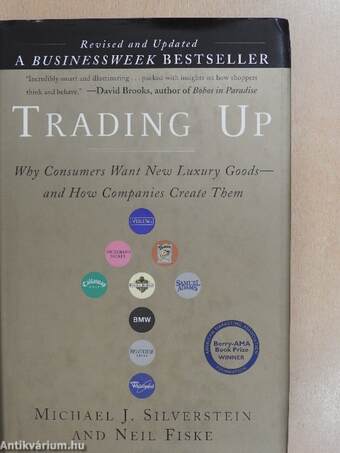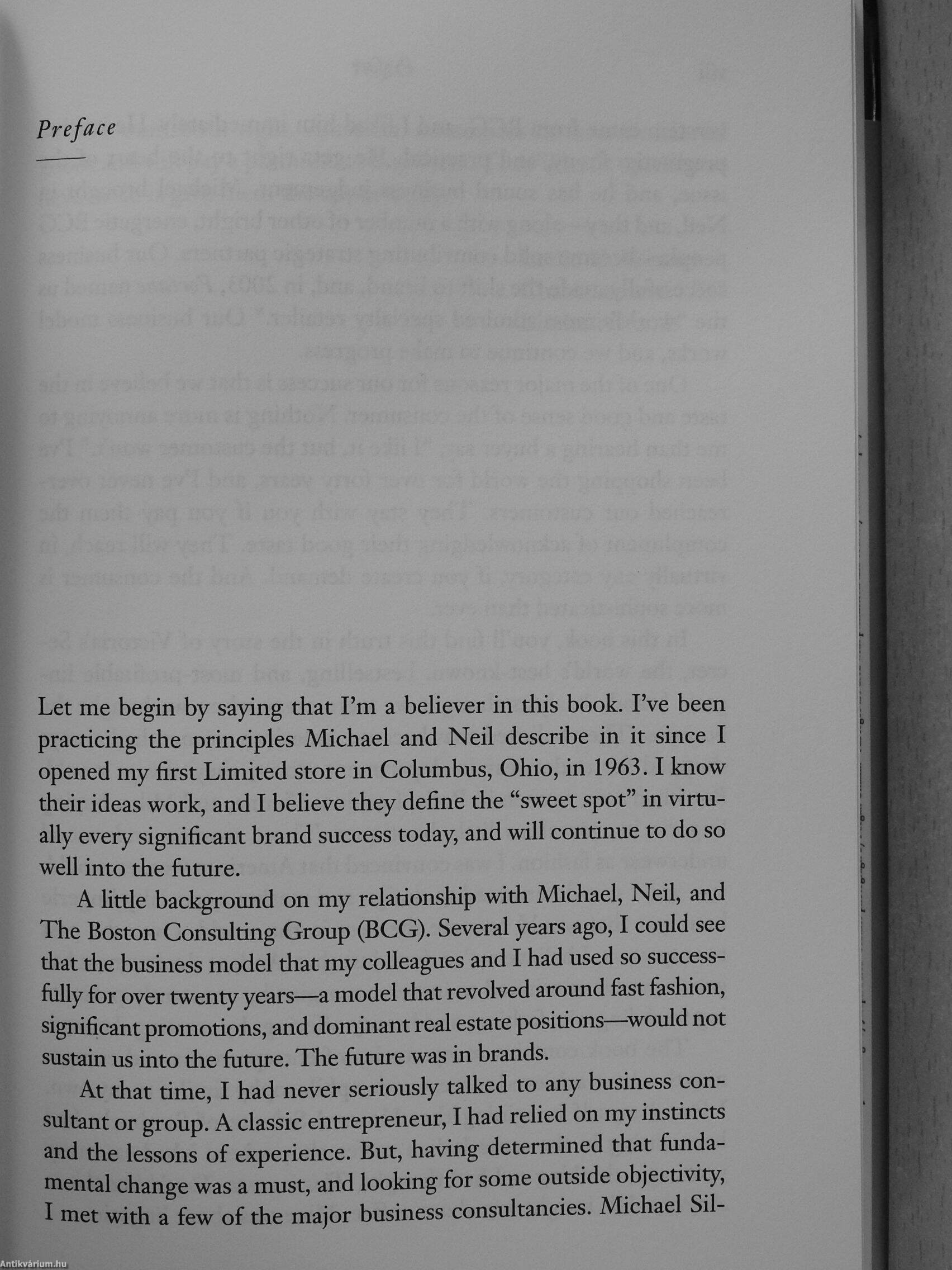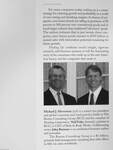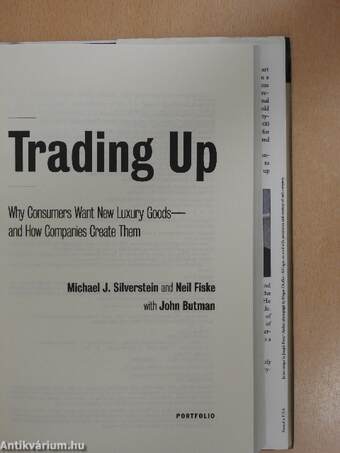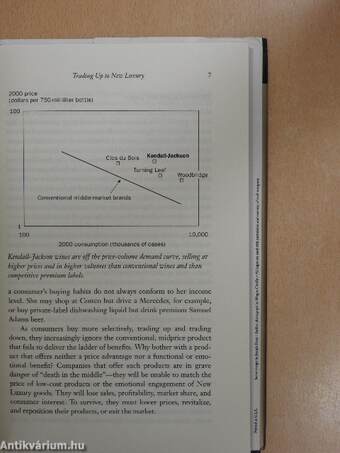1.067.168
kiadvánnyal nyújtjuk Magyarország legnagyobb antikvár könyv-kínálatát

VISSZA
A TETEJÉRE
JAVASLATOKÉszre-
vételek
Trading Up
Why Consumers Want New Luxury Goods--and How Companies Create Them
| Kiadó: | Portfolio |
|---|---|
| Kiadás helye: | New York |
| Kiadás éve: | |
| Kötés típusa: | Ragasztott kemény papírkötés |
| Oldalszám: | 316 oldal |
| Sorozatcím: | |
| Kötetszám: | |
| Nyelv: | Angol |
| Méret: | 24 cm x 16 cm |
| ISBN: | 1-59184-013-9 |
| Megjegyzés: | Néhány fekete-fehér ábrával. |
naponta értesítjük a beérkező friss
kiadványokról
naponta értesítjük a beérkező friss
kiadványokról
Előszó
TovábbFülszöveg
Trading Up
has become a fact of life.
A shipping clerk earning $25,000 a year treats herself to
silk pajamas at Victoria's Secret. A young professional
earning $50,000 springs for a Kendall-Jackson varietal
wine. A dual-income couple earning $125,000 orders
a $4,000 Viking range for their town house even though
the developer offered to throw in a perfectly serviceable
generic range at no extra charge.
These purchases reflect an important worldwide
behavioral shift. Consumers today are willing to pay
a significant premium for goods and services that are
emotionally important to them and that deliver the
perceived values of quality, performance, and engage-
ment. But in other categories that aren't emotionally
important, they become bargain hunters: a passionate
Mercedes driver will shop at Target every weekend; a
construction worker who splurges on a $3,000 set of
Callaway golf clubs will also buy store-brand groceries.
What are the financial and emotional... Tovább
Fülszöveg
Trading Up
has become a fact of life.
A shipping clerk earning $25,000 a year treats herself to
silk pajamas at Victoria's Secret. A young professional
earning $50,000 springs for a Kendall-Jackson varietal
wine. A dual-income couple earning $125,000 orders
a $4,000 Viking range for their town house even though
the developer offered to throw in a perfectly serviceable
generic range at no extra charge.
These purchases reflect an important worldwide
behavioral shift. Consumers today are willing to pay
a significant premium for goods and services that are
emotionally important to them and that deliver the
perceived values of quality, performance, and engage-
ment. But in other categories that aren't emotionally
important, they become bargain hunters: a passionate
Mercedes driver will shop at Target every weekend; a
construction worker who splurges on a $3,000 set of
Callaway golf clubs will also buy store-brand groceries.
What are the financial and emotional pressures
and social forces that drive these product choices? What
are the benefits that qualify a premium-price product
or service for mass acceptance? And how can an estab-
lished producer create a successful mass luxury brand?
In Trading Up, a world-class team of consultants
and researchers explores these questions and shows
how companies create premium brands that appeal to
the mass-market consumer. The book is teeming with
ideas that are relevant to product developers, business
strategists, marketers, and social critics as well as con-
sumers themselves.
(continuedfrom front flap)
For many companies today, trading up is a smart
strategy for achieving growth and profitability in a world
of cost cutting and shrinking margins. In dozens of cat-
egories, new luxury brands are selling at premiums of 20
percent to 200 percent over conventional goods and in
much larger volumes than traditional "old luxury" goods.
The authors estimate that in just twenty-three cate-
gories, mass luxury goods amount to $350 billion in
annual sales with tremendous potential remaining for
future growth.
Trading Up combines social insight, rigorous
research, and business acumen to tell the fascinating
story of the consumers who trade up to the new Amer-
ican luxury and the companies that create it.
Michael J. Silverstein {left) is a senior vice president
and global consumer and retail practice leader at The
Boston Consulting Group (BCG) and the coauthor of
Breaking Compromises. Neil Fiske, formerly a partner at
BCG, is CEO of Bath & Body Works. Collaborating
writer John Butman is an established business author
and journalist.
The Boston Consulting Group is a $1 billion,
privately held management consulting firm with offices
in fifty-six cities worldwide. Vissza
Témakörök
- Közgazdaságtan > Menedzserképzés, marketing
- Szociológia > Szociálpszichológia
- Idegennyelv > Idegennyelvű könyvek > Angol > Közgazdaságtan > Menedzserképzés, marketing
- Idegennyelv > Idegennyelvű könyvek > Angol > Szociológia > Szociálpszichológia
- Pszichológia > Alkalmazott lélektan > Egyéb
- Pszichológia > Idegennyelvű > Angol
- Pszichológia > Szociálpszichológia > Általában
- Közgazdaságtan > Lexikonok, kézikönyvek, szótárak
- Idegennyelv > Idegennyelvű könyvek > Angol > Közgazdaságtan > Lexikonok, kézikönyvek, szótárak
- Idegennyelv > Idegennyelvű könyvek > Angol > Pszichológia



